Introduction
The Iran-backed Houthi militia is a radical Shia organization that has taken over control of Yemen's most populous regions since 2014. In response, the Saudi-led coalition launched a military campaign in 2015 to prevent the group from conquering all of Yemen and to reinstate the internationally recognized Government of Yemen. With training and arms from the "axis of resistance," including designated terrorist groups Lebanese Hezbollah and Iran's Islamic Revolutionary Guards Corps (IRGC), the Houthis managed to hold the coalition forces at a stalemate and launch hundreds of rocket and missiles at Saudi Arabia and the UAE.* Despite continued international efforts to broker a peaceful solution to a civil war in Yemen which has decimated the country, the Houthis appear unwilling to compromise and are likely gearing up for a renewed round of fighting after around 1.5 years of relative quiet.
The Houthi war machine is unable to procure weapons through lawful means due to the arms embargo imposed on the group by the United Nations Security Council.* However, this has not dissuaded them from doing so in ways that circumvent regulation to ensure continued access to critical materiel. The Houthis have created covert networks for the procurement of weapons which are funded by the movement's ill-gotten gains.
The U.S. designation of Saleh Mesfer al-Shaer* sheds some light on how this mechanism works. According to the November 2021 announcement by the U.S. Department of the Treasury, "Major General Saleh Mesfer Alshaer, a close ally of Houthi leader Abdelmalik al-Houthi, serves as both the commander of the Houthi-controlled military logistics support organization, where he assisted the Houthis in acquiring smuggled weapons, as well as the officer responsible for managing all assets and funds confiscated by the Houthis." Al-Shaer was alleged to have overseen the Houthis' confiscation of assets valued at upwards of $100 million, some of which were later signed over to members of al-Shaer's family, including his brother Abdullah and his nephew Raed. The targets of these extortion schemes included Yemeni politicians opposed to the Houthis, banks, privately owned corporations, and even hospitals. Those Yemenis that did not comply with al-Shaer's demands by handing over their assets were subject to indefinite detention by the Houthis internal security apparatus.* The seized assets were then used to fund the acquisition and smuggling of weapons to the Houthis. Saleh al-Shaer was sanctioned in accordance with Executive Order (E.O.) 13611 for having engaged in acts that directly or indirectly threaten the peace, security, or stability of Yemen.
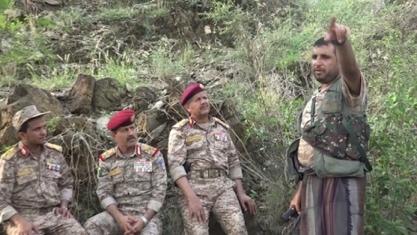
Sanctioned Houthi official Saleh Mesfer al-Shaer (second from right).*
In March 2021, Commander of Houthi Naval Forces Mansur al-Sa'adi and Commander of Houthi Air Force Ahmad 'Ali Ahsan al-Hamzi had also been designated by the U.S. Department of the Treasury, pursuant to E.O. 13611, for acts that directly or indirectly threaten the peace, security, or stability of Yemen. Both were alleged to have played a role in the acquisition of Iranian-made weapons and then utilized those weapons in the Yemeni civil war.* Al-Hamzi died in the summer of 2023 under "mysterious circumstances" which are elaborated upon later in the report.*
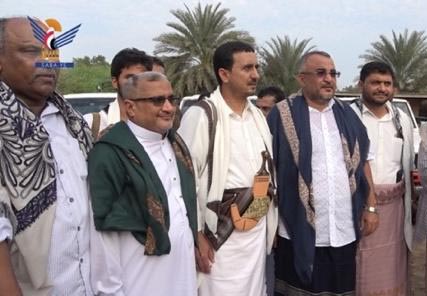

Left: General Mansour al-Sa'adi (far right).* Right: A scene from the "martyr video" produced for General Ahmed al-Hamzi following his death.*
Yet, many other Houthi officials work in military and defense procurement while remaining under the radar. This report aims to map out the senior leadership of the Houthi procurement and logistics arms* as well as corporations/entities that facilitate these activities. This report will cover both the Ministry of Defense (MoD) as well as the Ministry of Interior because in the Houthi regime, as in many authoritarian Arab governments, the Ministry of Interior is one of the most powerful ministries which oversees the state's premier intelligence and security services. As the nature of the covert procurement networks makes them opaque, this report cannot claim to be comprehensive, but it will contribute considerably to exposing a whole cadre of Houthi officials and entities engaged in sanctionable activities.
Military and Diplomatic Context
Following the recent Saudi-Iran de-escalation pact* and the ongoing Saudi-Houthi ceasefire negotiations,* the issue of Houthi defense procurement may have appeared to be of declining significance. But despite Iran's commitment to Saudi Arabia that it would stop arming the Houthis* and Houthi participation in peace talks, Sanaa continues to expand its arsenal with new and improved weapons from Iran. The deaths of Houthi Generals Ahmed al-Hamzi and Mohammed al-Hammasi in August of 2023, well after the Saudi-Iran agreement had been inked, was reported by government and media sources to have resulted from an explosion while senior Houthi officials and their Iranian and Hezbollah advisors test-fired new weapons.* Suspicions regarding the circumstances of the deaths of these senior officials intensified as Houthi news sources published inconsistent and vague explanations for al-Hamzi's demise* and did not cite al-Hammasi's cause of death.*
Regardless of the circumstances of the Houthi commanders' deaths, the Houthis publicly displayed their latest weaponry during an annual military parade in Sanaa on September 21, 2023. As the rockets and missiles were towed past the podium, Houthi military spokesman General Yahya al-Sarea announced the following new additions to the group's arsenal:*
- Toufan: A long-rang surface-to-surface ballistic missile, based on the Iranian "Ghadr" which has a range of around 2,000 km.*
- Tankeel: A medium-range ballistic missile that comes in two versions, surface-to-surface and anti-ship, and which is likely based on the Iranian "Raad-500."*
- Aqeel: A long-range surface-to-surface missile, based on the Iranian "Qiam" with a range of 800 km but upgraded to include precision guidance.*
- Quds-4: The latest in a line of surface-to-surface precision-guided Quds missiles (following Quds versions 1-3), which reportedly has a range of up to 2,000 km* and advanced stealth features.* The Houthi Quds missiles are based on the Iranian "Soumar"/"Hoveyzeh" missile family.*
Because Yemen has no known advanced defense industrial base, it is logical to assume that the recently claimed "leaps" in domestic production* are in fact capabilities provided by external sources. Given the unmistakable resemblance that new Houthi missiles bear to known Iranian missile systems, and the fact that Iran has previously served as the primary source of weapons for the Houthis,* it seems highly probably that these weapons are supplied by the Islamic Republic.
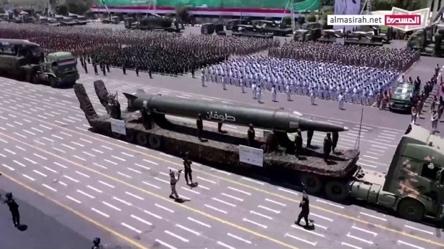
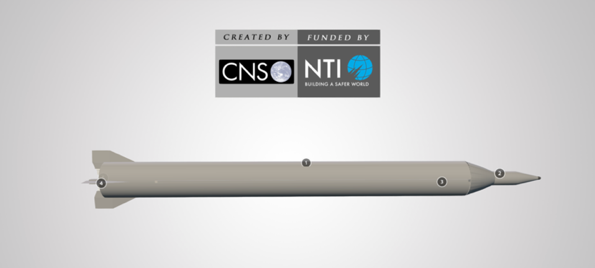
The newly unveiled Houthi Toufan (left)* and the Iranian Ghadr-1* (right) upon which it is based.
One ought to be skeptical of Houthi claims on almost any matter, including military and industrial capabilities, given the duplicitous and ruthless nature of the regime. In fact, one keen observer noted how, during the 2023 parade, the Zelzal-3 was billowing in the wind* and needed to be held in place – indicating that the Houthis were displaying a mock-up rather than a real rocket. This would corroborate an expert analysis that the militia possesses few (if any) Zelzal-3s and only places these models on display to make the Houthi arsenal “look more imposing than it really is."* But a healthy dose of skepticism is a far-cry from a blanket assumption that all the Houthi claims are bunk, especially in light of their previously demonstrated capabilities of their weapons (regardless of origin)* and the fact that during the recent parade the group surprised the crowd by flying an F-5 fighter jet overhead.* The Houthis have not had any semblance of manned airpower since at least 2015, and they appear to have acquired it recently despite eight years of a Saudi-led campaign to degrade their capabilities.* It is reasonable to assume that this aircraft, or at least any necessary spare parts to restore it, were sourced from Iran as well.*
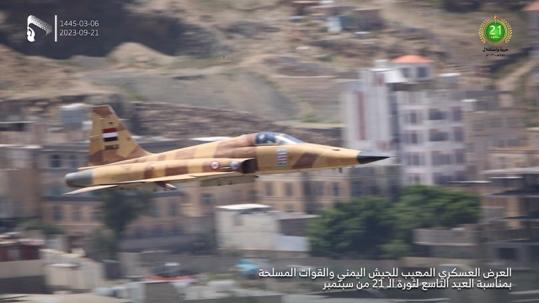
After more than 8 years of fighting against the Saudi-led coalition, the Houthis unveil a restored F-5 fighter jet in a parade on September 23, 2023.*
The recent Houthi attacks on Israel,* following the outbreak of the Hamas-Israel war on October 7, 2023, do not initially appear to have utilized the group’s recently unveiled weapons systems.* However, at least some of the footage released by the Houthi propaganda apparatus of the group’s launches against Israel appears to have been recycled footage.* Regardless, the attacks on Israel highlight the risks that the extremist Houthi movement poses to the region and why it is essential to expose and disrupt their military procurement activities in order to prevent them from acquiring dangerous weaponry.
Alongside their more aggressive regional activities, the Houthis also appear to be escalating on the Yemeni battlefield after a prolonged period of relative quiet. In the summer of 2023, the Houthis had reportedly amassed around 30,000 troops adjacent to Yemen’s oil-rich Marib province,* a region that they had desperately sought to conquer before the April 2022 ceasefire. In late September 2023, just days after a round of Saudi-Houthi peace talks concluded in Riyadh, the Houthis sent a threatening message to the Kingdom by launching a drone attack which killed four Bahraini troops serving in the Saudi-led coalition along the Saudi-Houthi border.* Then, in late October, they killed 4 Saudi troops in cross-border clashes.*
Despite considerable investment in diplomatic efforts to end Yemen’s civil war, political agreements are unlikely to be able to rein in the Houthis’ extremist ideology. Saudi Arabia has made significant overtures to achieve a peaceful outcome in Yemen,* while the Houthis have shown little if any flexibility and continue to threaten the Kingdom with renewed violence if it does not accept all of their demands.* But even if the Saudis and Houthis were to reach a ceasefire agreement, it would be difficult to enforce and would not comprehensively cover the latter’s ambitions to engage in malign activities throughout the region, including attacks on southern Yemen, UAE, Israel, and U.S. interests in the Middle East.*
Whatever the outcome of Saudi-Houthi peace talks, the Houthis will remain a well-armed and dangerous member of Iran’s “axis of resistance.” The following sections identify individuals and entities involved in procuring the tools and resources that make Houthi defense and intelligence organizations more dangerous.
Brig. Gen. Abdullah "Abu Abdelmajeed"* Mesfer al-Shaer
(عبدالله ״أبو عبدالمجيد״ مسفر الشاعر)
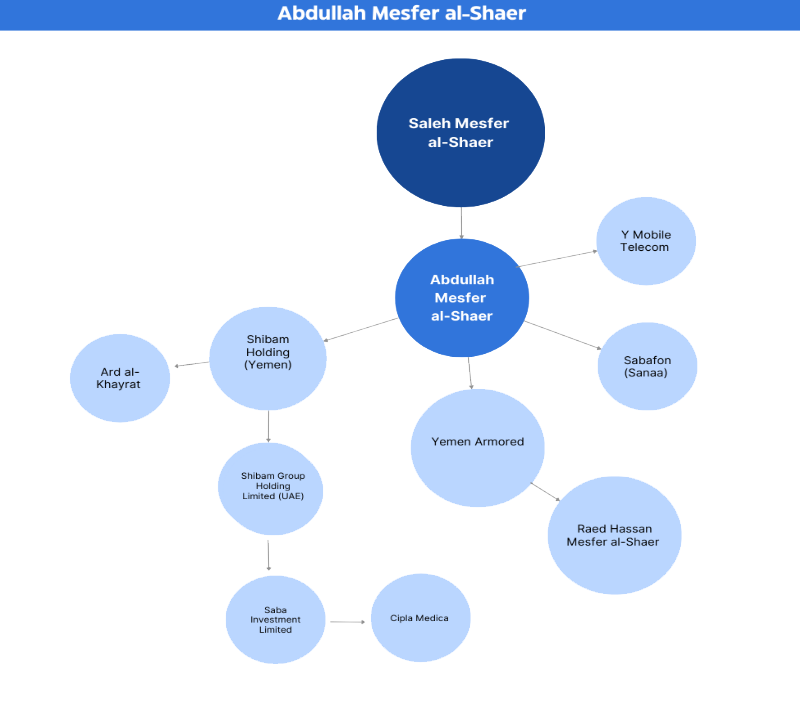
- Current Role: President of Yemen's General Holding Company (Shibam Holding), Director of Yemen Armored, Chairman of the Boards for Sanaa-based Sabafon and Y Mobile telecom providers
- Previous Position(s): Chief of the Directorate of Logistics and Supply (unknown-2018), Ministry of Interior
Abdullah Mesfer al-Shaer is the brother of sanctioned Houthi leader Saleh Mesfer al-Shaer. Based on the evidence collected, Abdullah likely works in those same realms as his brother Saleh: managing Houthi procurement and controlling assets confiscated from the regime's political enemies. He is well positioned to work in these fields as he served as the Ministry of Interior's chief of the Directorate of Logistics and Supply until 2018, and since 2019, he served as chairman of the regime's asset management company Shibam Holding Company and numerous other major corporations.*
Yemen Armored
In July 2019, Abdullah was appointed to the role of director of the private security company Yemen Armored.* He assumed this position after the Houthis detained and tortured the previous owner of Yemen Armored, Ahmed Saleh Ali Arrahbi, and then confiscated Arrahbi's company.* With Abdullah al-Shaer as director, the company has made millions of dollars in unexplained payouts to Saleh al-Shaer's nephew Raed Hassan Mesfer al-Shaer (رائد حسنمسفر الشاعر).* Some Yemeni news outlets have also suggested that the Houthis use Yemen Armored as a front to legitimize their acquisition of military and security capabilities abroad.*
When, in 2019, the United Nations was made aware that Yemen Armored had been confiscated and is now under Houthi control, the U.N. said that it had not previously been aware of the change in ownership but stopped short of saying that it would end its commercial relationship with the company. It remains unclear whether the U.N. and a host of other humanitarian organizations listed as customers on the company's website (e.g., World Food Program, Save the Children, UNICEF, etc.),* continue to patronize the company which apparently serves as a slush fund for the al-Shaer family and finances Houthi-aligned activities.*
In the case of UNICEF, discrepancies in the organization's annual budget raises significant questions. In 2018, prior to the Houthi takeover of Yemen Armored, UNICEF employed the "Safety and Security Services" of Stallion Security and Yemen Armored for $2.3 million and $1 million respectively.* In 2019, after it was officially made aware of the Houthi takeover of Yemen Armored, UNICEF's budget has no line items at all for "Safety and Security Services"* – which would be an odd budget cut for an organization operating in a war zone. Then, in 2020, UNICEF once again lists a $2 million expenditure for the services of Stallion Security while no other safety and security provider is listed.*
It is difficult to understand why, in the absence of any major changes in the Yemeni theater, the budget for safety and security in Yemen would be cut back by one-third over the course of 2 years. One possible explanation for the disparity in spending on security between 2018 and 2020 is that factors such as the devaluation of the YER drove down the prices of the vendors, and then Stallion was able to provide what cost $3.3 million from two vendors in 2018 for $2 million in 2020. But this does not appear likely given that UNICEF's generally operates in USD rather than local currency and its overall budget for local procurement in Yemen jumped from $131 million to $246 million during those years rather than contracting.* A more likely explanation is that the organization used other means to pay for services that would have been difficult to list as budget line items: either by including them in the budget under a vague company name and category,* or use of cash, potentially facilitated by its Unconditional Cash Transfer program introduced in 2019.* From 2021 onward, UNICEF ceased to publish line items in its budget for Yemen.*
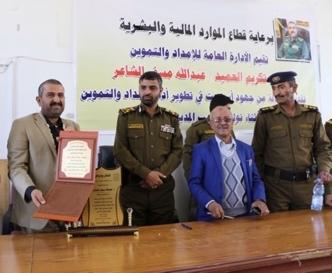
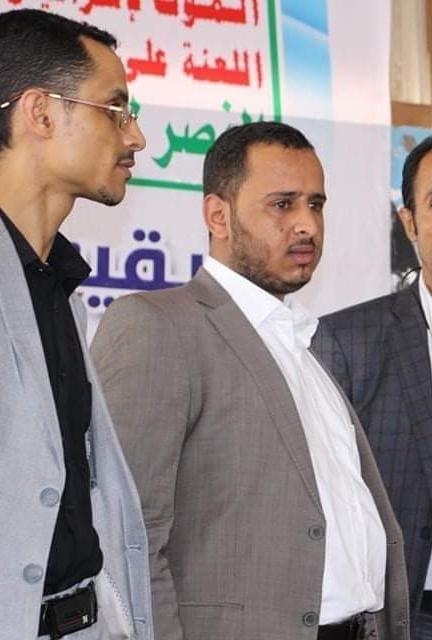
Left: Maj. Gen. Abdullah al-Shaer (far left) receives an award from the Directorate of Logistics and Supply for achievements during his tenure. To his right stands Brig. Gen. Ismail Mo'ayyed who succeeded al-Shaer.*
Right: Raed Hassan Mesfer al-Shaer (center) is pictured in a Facebook post* in a forum where he is criticized for having so many honorary positions in universities, hospitals, and private companies due to his familial ties.
Shibam Holding
Shibam Holding (شبام القابضة) was established by the government of Yemen to function as its private investment arm, and it was seized by the Houthis after they took Sanaa in 2014. Given Abdullah al-Shaer's appointment as chairman of Shibam Holding around 2019, it is likely that the company is engaged in activities that fund the Houthi war effort and/or military procurement. SAM Rights and Liberties (SAMRL), a human rights organization based in Geneva seeking to monitor human rights in Middle East, describes Shibam "as a quasi-governmental company, through which the revenues of the confiscated companies are invested."*


The official logos from the social media accounts of Shibam Holding and Yemen Armored.
Shibam Holding appears to operate in secrecy when compared with other national investment funds. When examining Shibam's digital footprint, including its website,* Facebook page, and Twitter account,* there is almost no information available about its activities, assets, or plans, with the exception of a possible real estate development deal with an equally opaque Yemeni company called Ard al-Khayrat (شركه ارض الخيرات للتموين والتوريدات والمناقصات المحدودة).* Ard al-Khayrat's Facebook page was created on July 16, 2021, and just five days later, it announced a cooperative project with the Shibam Holding Company and Yemen's Ministry of Transport.
It is worth noting, that there is also a Shibam Group Holding Limited which is registered in Ras al-Khaimah, UAE. The UAE-based company remains active and has recently purchased a controlling share* of Saba Investment Limited, which owns the Sanaa-based company Cipla Medica Pharmaceutical and Chemical Industries Limited.* As both the purchasing company (Shibam) and the purchased company (Saba) are based in UAE and have listed their physical mailing addresses at P.O. boxes as well as their email addresses at the consulting firms Deloitte and Baker Tilly International, there is little to no visibility as to who the major stakeholders are.
Yet it certainly seems unusual that Shibam and Saba were registered in Ras al-Khaimah on the exact same day, January 7, 2014, and their business registration numbers are sequential (11584542 and 11584543). This appears even more unusual when one takes into account that Ras al-Khaimah is a fairly uncommon option for registering a business in the UAE; fewer than 5 percent of the more than 600,000 businesses incorporated in the UAE are registered in Ras al-Khaimah.* This apparent coincidence points to the possibility that the two companies have always been connected and Shibam's purchase of Saba may have been an operation conducted to move ill-gotten gains.
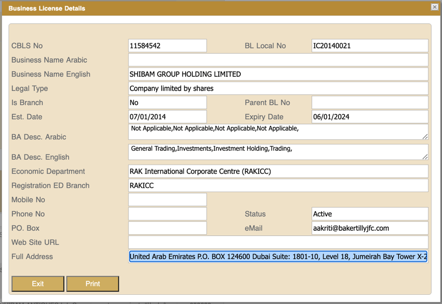

The commercial registrations of Shibam Holding (left) and Saba Investment (right) in Ras al-Khaimah.*
Maj. Gen. Ismail al-Moayyed (إسماعيل المؤيد)
- Current Role: Head of the Immigration and Passports Authority
- Previous Position(s): Chief of the Directorate of Logistics and Supply (2019-2020),* Ministry of Interior
Maj. Gen. Ismail al-Moayyed has served in senior positions within the Houthi regime, as have other members of his family. In fact, Ismail al-Moayyed's brother Nabil "Abu Mostafa" al-Moayyed served as commander of the southern Marib military front until his death in 2023.*
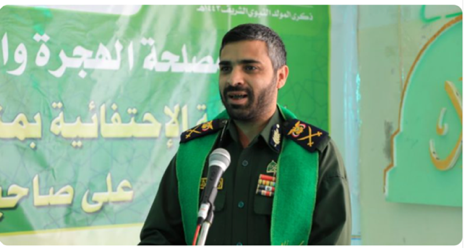

Left: Maj. Gen. Ismail al-Moayyed who served as Chief of the the Directorate of Logistics and Supply.
Right: A martyrdom poster for Ismail's brother Nabil who served as the commander of the southern Marib front prior to his death in 2023.
Ismail al-Moayed's most recent roles within the regime include senior leadership positions in the Ministry of Interior. He appears to have assumed the role of chief of the Directorate of Logistics and Supply around 2019 and served in that position until late 2020.* As mentioned in the case of Abdullah al-Shaer, this role includes procurement for the regime by expending its illicit assets.
In his farewell speech following his departure from the Directorate, al-Moayyed stressed that the organization "has a major role in the success of the security establishment."* Al-Moayyed's successor praised the Directorate's achievements during al-Moayyed's tenure despite the challenges posed by the anti-Houthi coalition. Since 2020, al-Moayyed has moved on to serve as the head of the Immigration and Passports Authority.
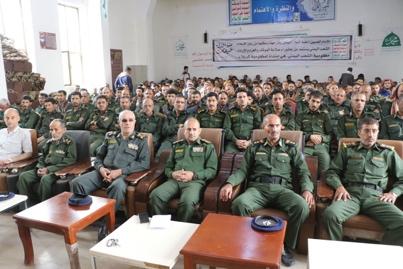
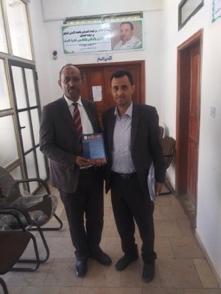
Left: Deputy Director of the Directorate of Logistics and Supply Fahd Ali Taher (first row, center).*
Right: Ghamdan Haji (right), the chief of staff of al-Moayyed during his tenure at the Directorate.*
During al-Moayyed's tenure as chief of the Directorate of Logistics and Supply, Col. Fahd Ali Taher (فهد علي طاهر) served as his deputy. Al-Moayyed's chief of staff was Ghamdan al-Haji (غمدان الحجي). As recently as 2023, Taher appears to have remained in that role.
Brig. Gen. Osama Abdullah Mufaddal (أسامة عبدالله مفضل)
- Current Role: Chief of the Directorate of Logistics and Supply (2020-Present),* Ministry of Interior
- Previous Position(s): Unknown
Brig. Gen. Osama Mufaddal has served as chief of the Directorate of Logistics and Supply since at least December 2020, and he continues to serve in that role as of the time of writing. In 2021, Mufaddal awarded his predecessor Ismail al-Moayyed with a "shield of honor [award], along with a certificate of thanks and appreciation," from the Directorate of Logistics and Supply .*
Scant information is available regarding Mufaddal's previous positions, and presumably he was serving in a secretive post in the regime before assuming his current role. In general, there are few newcomers to the Houthi elite. It is made up of a combination of longtime loyalists to the movement and those who are from prominent families with close/marital ties to the al-Houthi clan.
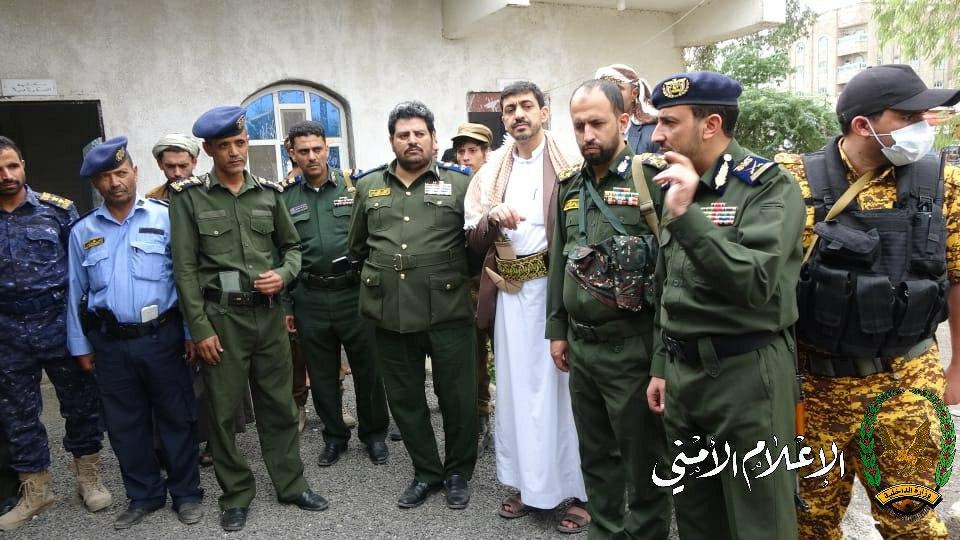
Brig. Gen Osama al-Mufaddal (front row, second from right).*
As previously mentioned, Col. Fahd Ali Taher has continued in his role as deputy chief of the Directorate of Logistics and Supply. However, alongside Taher, Brig. Gen. Abdul Qudous al-Dailami (العميد الركن عبد القدوس الديلمي) appears to have been appointed to serve as Mufaddal's deputy. Prior to serving as the Directorate's deputy, al-Dailami served as deputy commander of the Central Security Forces.* The Central Security Forces are a counter-intelligence organization tasked with ensuring the survival of the Houthi regime against domestic threats.*
Maj. Gen. Muhammad "Abu Jaafar" al-Talbi (محمد "أبو جعفر" الطالبي)
- Current Role: Assistant Minister of Defense for Logistics and Director of the Military Procurement Department,* Ministry of Defense
- Previously Served as: Unknown
Like Saleh Mesfer al-Shaer,* Maj. Gen. Muhammad al-Talbi has taken on the role of assistant minister of defense for logistics. Al-Talbi appears to either share or have inherited al-Shaer's portfolio as they are of the same rank. Both are assistant ministers of defense at the rank of major general. However, in the Houthi leadership structure, formal rank is not necessarily indicative of actual position in the hierarchy, and the U.N. Panel of Experts assessed that al-Talbi has become al-Shaer's assistant.* According to Yemen expert Michael Knights, al-Shaer and al-Talbi have divided up the roles in smuggling weapons. Al-Shaer coordinates with Iran's IRGC weapons suppliers, while al-Talbi coordinates the onshore transshipment network that handles trucking of smuggled goods to their storage locations.*
Regardless of whether al-Shaer and al-Talbi are now working together or have served in this role in sequence, presumably the areas of responsibility are similar and still require using illicit assets to fund the Houthis' weapons programs. Seeing as how al-Talbi is not only assistant minister of defense for logistics but also director of procurement for the Ministry of Defense, it is highly likely that he is overseeing Houthi force-building efforts by acquiring capabilities from abroad and/or developing the ability to produce weapons domestically.
Al-Talbi's deputy, who serves as the deputy director of the Military Procurement Department in the Ministry of Defense, is Brig. Gen. Adel al-Moayyed (عادل المؤيد).* Al-Talbi's chief of staff is Col. Adnan al-Halyani (عدنان الحلياني).*
Maj. Gen. Abdelmalik al-Durra (عبدالملك الدرة)
- Current Role: Deputy Director of the Logistics Support Agency (2019-Present*), Ministry of Defense*
- Previous Position(s): Director of Logistics and Supply at the Ministry of Defense,* Commander of the Hodeidah Air Defenses,* Chief of Air Force Intelligence*
Unlike many senior Houthi appointees, Maj. Gen. Abdelmalik al-Durra was a career military officer who served in the armed forces under the Government of Yemen during decades-long rule of strongman Ali Abdullah Saleh. Saleh ruled Yemen from the time of its unification in 1990 until he was deposed in 2012 as a result of the Arab Spring uprising. Following his removal from office, Saleh aligned with his former nemeses the Houthis to overthrow the interim government under President Hadi. Presumably al-Durra was one of the Saleh loyalists who followed former president of Yemen into an alliance with the Houthis, and one of the very few Saleh loyalists who have achieved and maintained positions of significant authority despite the 2017 fallout between Saleh and the Houthis which resulted in the former's demise.
Prior to the Houthi takeover in 2014, al-Durra served as Chief of Air Force Intelligence and Commander of Hodeidah Air Defenses. Since then, al-Durra served in the Houthi regime as Director of Logistics and Supply and then Deputy Director of the Logistics Support Agency in the Ministry of Defense.* In his current role in the Logistics Support Agency, he is a deputy to U.S.-sanctioned Houthi official Saleh Mesfer al-Shaer.*
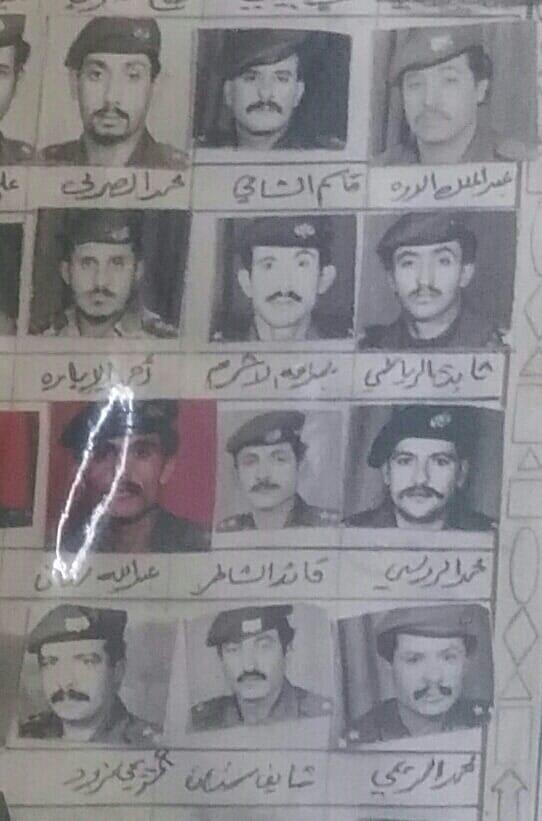
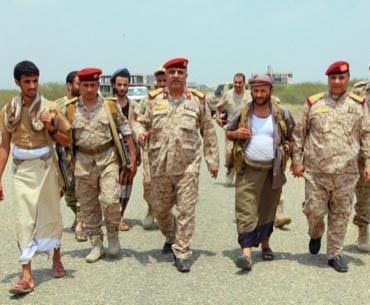
Left: A yearbook photo of Houthi official Abulmalik al-Durra (top right corner) from 1980s, in the early years of his military career.*
Right: al-Durra (far right) in 2023 while he is serving as the Deputy Director of the Logistics Support Agency in the Houthis' Ministry of Defense.*
Brig. Gen. Hadi "Abu Ali" al-Kahlani (هادي ״أبو علي״ الكحلاني)
- Current Role: Director of Ibb Security (since 2022)*
- Previous Position(s): Director of Hodeidah Security (2017-2022), and member of Abdelmalik al-Houthi's personal protection team*
Hadi "Abu Ali" al-Kahlani's first known role in the Houthi regime was serving as a bodyguard to the group's leader Abdelmalik al-Houthi. He served in this position from at least 2013 onward, and then leveraged his relationship with al-Houthi to receive senior appointments in key regions. At some point, al-Kahlani is reliably reported to have trained in Iran.*

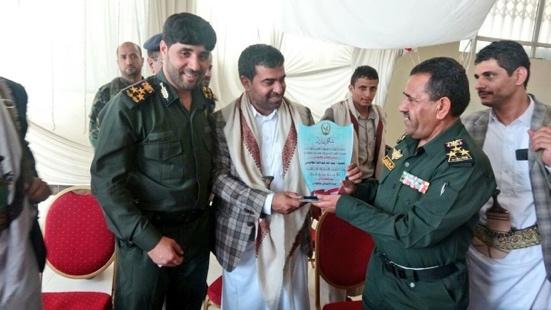
Left: In a televised address by Abdelmalik al-Houthi from around 2013, al-Kahlani can be seen standing guard in the background.
Right: Al-Kahlani (front row, left) in 2022 as he takes on the role of security chief for Ibb Governorate.*
In 2017, al-Kahalani's name is first mentioned by news media in reference to the coastal governorate of Hodeidah.* He served as the Houthis' security chief there until 2022,* but when he started in that role it was not officially announced in the same way that his departure would be several years later. During his time as security chief of Hodeidah, al-Kahalani was engaged in power struggles against other senior officials including the governor and the director of criminal investigations. Ultimately, he had them both arrested and emerged victorious.*
In 2018, Hodeidah was on the front lines of the Yemeni civil war, and a ceasefire agreement was brokered by the U.N. between the Houthis and the Saudi-led coalition to ensure that Yemen's maritime lifeline would not be cut off or destroyed as a result of the ongoing conflict. Al-Kahalani appears to have served as the Houthis' senior official in charge of the relationship with the U.N. Mission to support the Hudaydah Agreement (UNHMA).* The UNHMA was charged with monitoring Hodeidah's ports to prevent the smuggling of arms into Yemen. Hodeidah's three key ports (i.e., Hodeidah, Salif, and Ras Issa) make it a central component of the Houthis economic and military supply lines.
By virtue of al-Kahalani's control of the Hodeidah governorate and his communication with the U.N. and UNHMA, he was well positioned to facilitate Houthi smuggling of weapons into Yemen. Indeed, the centralization of power over Hodeidah into Kahalani's hands and the fact that many smuggling operations took place on that territory provided strong indications that he was, at the very least, aware of these activities.* That al-Kahalani was actually orchestrating arms trafficking through Hodeida was only exposted in 2022 – through the testimony of Houthi smugglers who were intercepted and detained by coalition forces.*
In June 2022, al-Kahalani was re-assigned to serve as security chief of the Ibb governorate.* Given his reputation as a ruthless enforcer trusted by Abdelmalik al-Houthi,* it is possible that al-Kahalani was shifted to Ibb to ensure that this majority-Sunni area on the Houthi frontlines did not breed an insurgency against the Zaidi rulers in Sanaa.
Wadi Kabir Company (شركة الوادي الكبير للخدمات اللوجستية)
The Wadi Kabir Company has been caught attempting to smuggle weaponry to the Houthis on several occasions.* Most recently, in March of 2023, company trucks were interdicted while transporting electricity generators from Oman to warehouses in Sanaa also owned by Wadi Kabir.* The generators were hollowed out, and they contained 52 anti-tank guided missiles (ATGMs) produced in Iran as well as a smaller generator that enabled the larger generator to appear functional if any suspicious inspectors sought to test it. A U.N. report noted that prior to this incident, Wadi al-Kabir "had previously been involved in smuggling for the Houthis."*

The background photo for Wadi Kabir's Facebook page.
The Omani company from which the trucks picked up the generators containing ATGMs was identified in the U.N. report as Rabia.* Rabia is likely the company registered in Oman as "Rabia Modern Investment Company" (شركه الرابية الحديثه للاستثمار), which was incorporated in September 2022 by two Yemeni nationals in their mid-30s, a-Hassan Muhammad Abdel-Karim al-Makhdi (الحسن محمد عبد الكريم الماخذي) and Adul Rahman Muhammad Saghir al-Usaimi (عبدالرحمن محمد صغير العصيمي). According to the U.N. report, the owners of Rabia also own Wadi al-Kabir.*
While Rabia has no digital footprint beyond its commercial registration in Oman, Wadi al-Kabir has a larger, if still minimal, digitial footprint. Wadi al-Kabir has a Twitter account* created in November 2020 which has not been active since December 2020. The account has fewer than a dozen followers and it includes a defunct link to a company website (http://wadikabir.com/), which is not functional. The company's Facebook is more active than its Twitter,* as it posted as recently as August 2023 and has over 700 likes. Still, its posts are devoid of almost any commercially relevant content (i.e., no prices, sales, detailed description of services, etc.). The Facebook page links to the same defunct website as the Twitter account, and the company has only one review posted in over three years.
The negligible efforts at digital marketing or building any sort of online presence, despite the apparent active status of the companies, supports the idea that social media profiles are intended to serve as a thin cover for a smuggling operation.
Conclusion
This report identified Houthi officials and entities engaged in acquisition and procurement to support the regime's dangerous ambitions. In all likelihood, what the report uncovers is only the tip of the iceberg in the Houthis' covert procurement operations. The individuals identified are senior officials with staff and connections around the region and beyond, building partnerships with rogue regimes and criminal actors in order to fund and arm the extremist Houthi movement.
It would be difficult to argue that the individuals noted in this report are not involved in activities which promote the Houthi war effort and domestic repression, given their ranks, uniforms, and positions in logistics/procurement directorates. Moreover, there is a clear precedent for sanctioning them. Saleh Mesfer al-Shaer's use of the regime's ill-gotten gains to finance military procurement led the U.S. government to sanction him under E.O. 13611 for having engaged in acts that directly or indirectly threaten the peace, security, or stability of Yemen. Thus, it remains unclear why al-Shaer's brother, his deputy, and others who are facilitating his work have yet to be designated by the U.S. Department of the Treasury.
Given the nature of international supply chains, covert procurement is precisely the type of rogue activity for which exposing and designating could be an especially effective response. For example, the precise and long-range cruise missiles that the Houthis have used to terrorize their fellow Yemenis and Gulf neighbors cannot be produced entirely in Yemen.* However, keeping the essential components out of Houthi hands will require constant vigilance, as illicit international supply chains may be vulnerable to exposure or disruption, but one should expect that they will be reconfigured in ways that circumvent any new enforcements measures.
Disrupting the Houthis' international commercial and procurement activities would be an essential component of a broader strategy to apply pressure to the group.* Directed pressure may not guarantee a positive outcome for the U.S. and its allies vis-à-vis the Houthis, but it is difficult to envision how one could be achieved without it.
Annex A
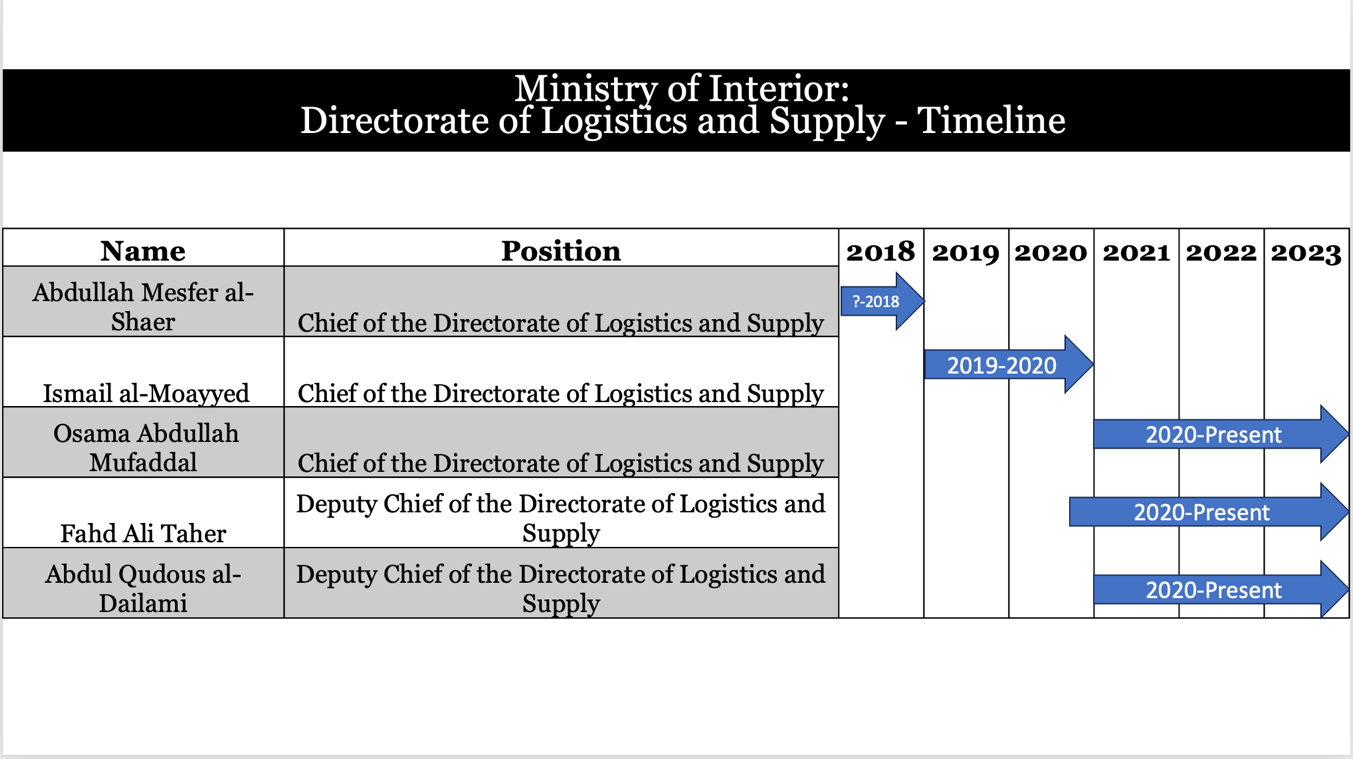
Graphic 1. Timeline of Ministry of Interior Directorate of Logistics and Supply
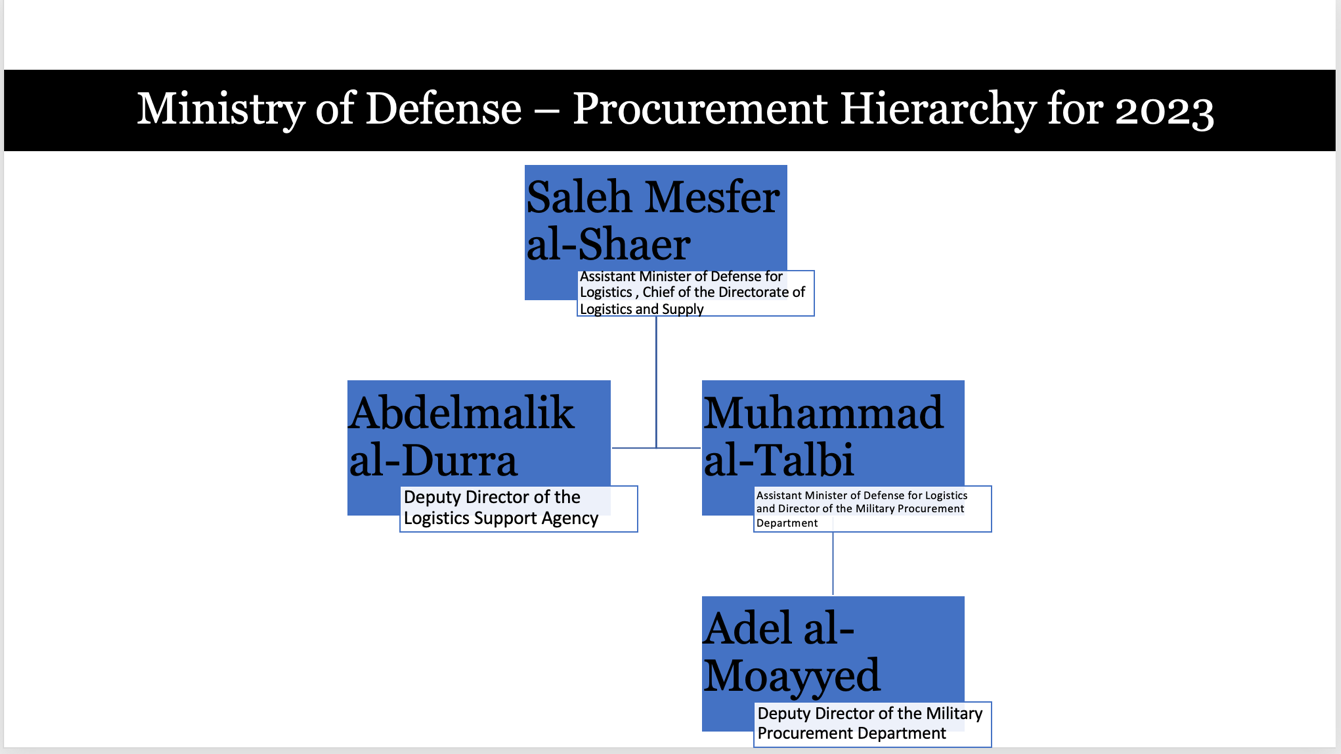
Graphic 2. Ministry of Defense Procurement Hierarchy
 TOP
TOP